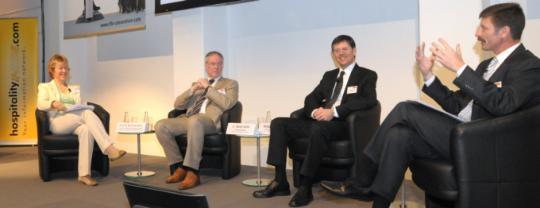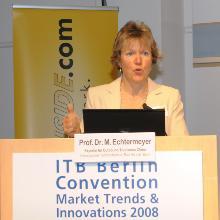3rd ITB Hospitality Day: Brand destinations to attract travellers from Asia
Berlin ((March 21, 2008). The first panel discussion of the 3rd "ITB Hospitality Day" at the ITB 2008 was about "Travel behaviour of Asian guests". Apart from displaying great love for small details, tourists from Far East set great store by prestigious brands. German outlet centres as in Metzingen or event destinations like the Nuerburgring already benefit from that. Those who know about the demands of guests from Asia, mainly of the Chinese, will earn profits. This also affects hotel development of new brand destinations.
 |
| "Destination brand" (from left): Prof. Dr. Monika Echtermeyer, Expert for Outbound Tourism China, International University of Applied Sciences Bad Honnef; Dr. Walter Kafitz, Managing Director Nuerburgring GmbH; Wolfgang Bauer, CEO Holy AG/Outlet City Metzingen and Marcel Schneider, CEO TUI China Travel Co. Ltd. |
By 2015, Deutsche Zentrale fuer Tourismus (German National Tourist Board) expects five million room nights from Chinese guests in Germany. According to Prof. Dr. Monika Echtermeyer of the International University of Applied Sciences in Bad Honnef, those aiming at convincing their guests of their services should deal with their preferences. "Guests from China," says the expert for outbound tourism, "are mainly looking for blissful sensations and romance. They are geared to symbols and need a story behind a brand." As an example of the slightly different Asian way of thinking she named the German city of Trier, which is not visited by Chinese due to its Roman history, but because there is the house where Karl Marx was born. Chinese, said Echtermeyer, knew the Grimm Brothers and Sissi, and they expect to find cosy eiderdowns and electric kettles in German hotels.
Another destination of Chinese visiting Germany is the Boss outlet in Metzingen, where 40 outlets gather in one place. Wolfgang Bauer, Chairman of Holy AG/Outlet City Metzingen, describes his customers as follows: "The Chinese provide an extreme status mentality. They like to show what they have." Furthermore, Chinese like to bring gifts for those who stayed at home. China imposes a 35 percent tax on luxury products. Buying real brand products in Germany is comparably cheap.
 |
| Prof. Dr. Monika Echtermeyer, expert for outbound tourism China |
Saving money with cheap hotels
Guests from China rather save money by reducing hotel costs instead of buying less. Despite that, Outlet City Metzingen decided to build a few hotels of its own. Building applications have already been filed, and this year is to see the start of the construction works. The first project will be a budget level 100-room hotel with a design touch. In addition, Holy was thinking about a catering construction that also attracts Chinese guests, according to Bauer. An expert of Chinese origin is to be consulted for the development.
Bauer knows that 35 percent of Chinese enjoy medium-class travel, while 42 percent enjoy first-class travel. Trips in the luxury segment are an exception. Marcel Schneider, CEO TUI China Travel, confirmed this as well. As a quality brand, TUI primarily concentrated on the delegation travel business with representatives of companies and the government promising secure margins. "Travellers care greatly for quality and time," says Schneider. However, this thriftiness with respect to accommodation costs mainly refers to first visits. "Second-time visitors are often brought down to earth by the experiences of their first trip and want to avoid repeating initial mistakes. This makes them more sensitive to quality", says the China expert.
Nuerburgring AG also concentrates on the booming influx from China. CEO Dr. Walter Kafitz has already made experiences with guests from China and plans to expand the area around the legendary race track in a way that Asian guests should really enjoy it. 215 million euros will be invested in a new area providing hotels, event catering and shopping. The core elements will be a covered shopping street, a convention and event hall as well as a karaoke bar. There will be three hotels - all of which will be operated by Lindner Hotels from Duesseldorf. This includes a 4-star hotel with about 160 beds and a spa right next to the stand of the Nuerburgring, a 3-star hotel with 65 rooms and a bungalow facility providing 1,000 beds, which is declared a "motor sport resort".
Additional benefit expected
"With this we want to keep guests and become a destination of our own," explained Kafitz. The number of guests is to grow from two million to 4.1 million visitors. Even today, the Nuerburgring collaborates with the Shanghai racing track.
At the Hospitality Day, Schneider of TUI pragmatically informed the audience about the most necessary requirements for a hotel aiming at accommodating Chinese guests. They were particularly interested in additional benefits like take-away gifts in bathrooms (combs, shampoos, shower caps etc.). "The cultural revolution is only 32 years ago. Even totally rudimentary things are regarded as great benefit - in contrast to our sophisticated markets," he says calmingly.
Mass business with Chinese was solely driven by rates. A hotel`s location is almost of no importance, while food was of great importance instead. Lobbies should be as large as possible, as Chinese would regard this as generosity. The numbers 4 and 7 were marred by negative associations and should therefore be avoided. If possible, mini bar costs should be included in the rate and not be calculated separately. German hotel restaurants were too quiet for Chinese guests - they should be as lively as possible. Chinese wished to deal with employees with a command of mandarin. Those who aim at driving up sales of his hotel shop should label products in Chinese. This gave evidence of respect for the Chinese culture and would be appreciated by customers.
More and more Chinese will come to Germany. That is for sure. The pace of this development is directly linked to the current visa regulations according to Schneider. Apart from that, a country`s foreign policy influences tourism. / Susanne Stauss
To print this article you have to be registered and logged in for newsletter, visitor or subscription.





